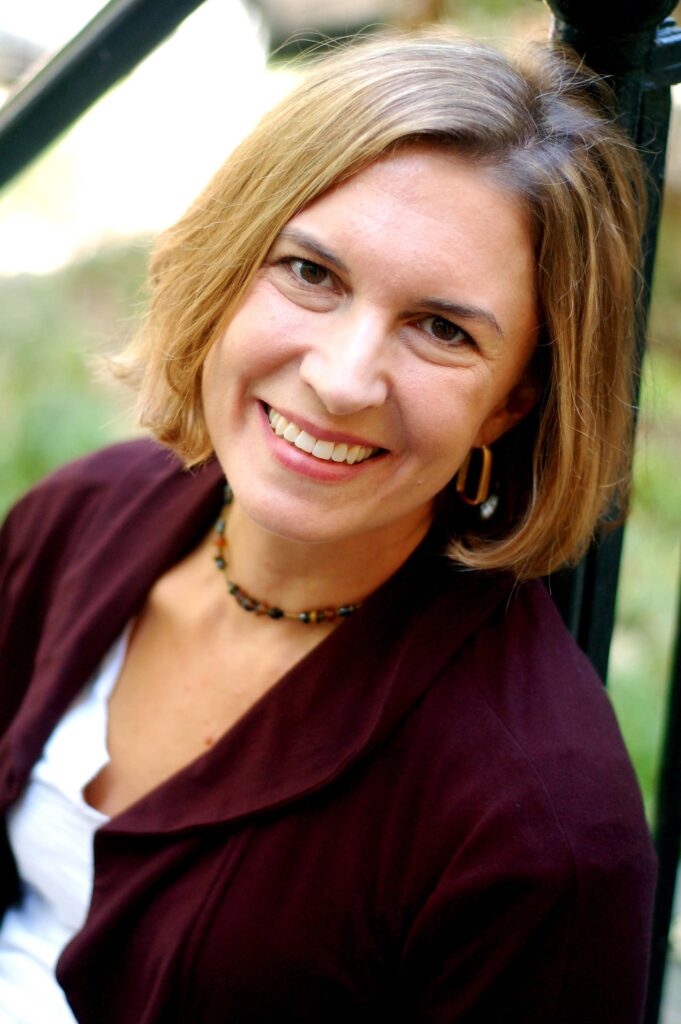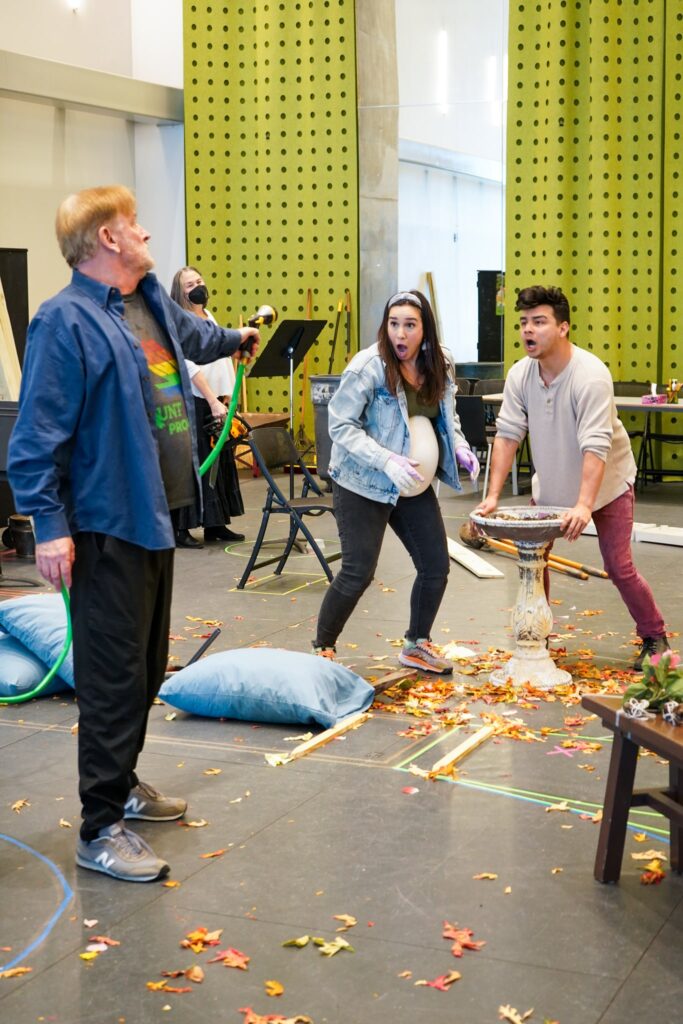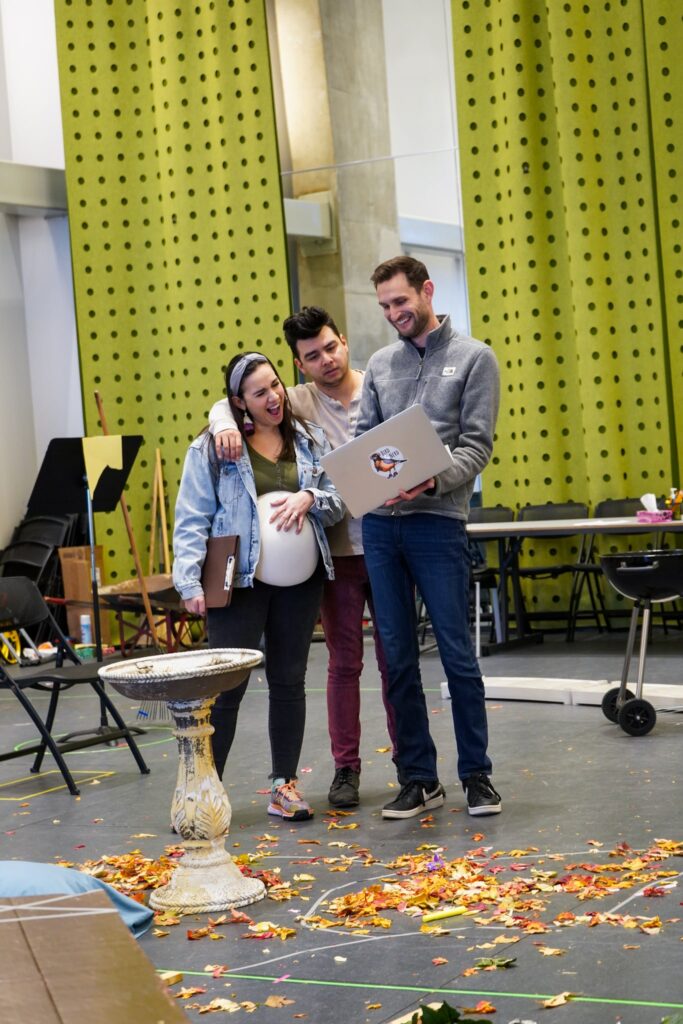Native Gardens writer Karen Zacarías speaks with DTC Playwright in Residence Jonathan Norton about the genesis of her play Native Gardens, crazy neighbors, and childhood bullies.
Jonathan Norton: Writers are always told to write what you know. But I read that you’re not a gardener and don’t have a green thumb at all. But the play explores the worlds of competitive gardens and eco-friendly gardening in vivid and funny detail. So, I’m so curious about what sparked Native Gardens for you.
Karen Zacarías: I was trying to find a subject to write about and I was at a dinner party and friends of ours said “Oh you should write about me. I’m having a fight with my neighbor.” And I said, “Oh, what are you fighting about?” He said the hedges and then someone else was like “Oh my parents are in a fight with their neighbors about their mailboxes.” I mean they were all of these absurd things, but the fights were very real. In fact, I have a friend who told me that one of their parents was stabbed by their neighbor over plants. And that got me thinking, wow, it’s interesting how fights about property are kind of primal. It’s about ownership and it’s about cultural aesthetics, right? And the fight between neighbors is always so vicious. It’s like a fight between siblings when you have to live so close to each other, and you’re fighting. It’s very, very stressful. And I started thinking, well, what happens if I explore this as a comedy?

JN: Laughter really brings people together and Native Gardens really brings people together. It’s enjoyed a healthy life around the country. It was even on American Theatre magazine’s 10 most produced plays of 2018-19. What do you think it is about the play that resonates so deeply with audiences and also with theaters?
KZ: I think there’s two different answers on it. One is that I was lucky, and I hit a zeitgeist of a moment in time about a nation divided over walls and fences and borders. And that idea of being able to talk about it without people getting defensive was something the theaters and audience members seem to want. The other thing is the niche of also being a play that brings audiences in touch with a couple they’re used to seeing onstage and also a couple they’re not used to seeing onstage. Oh, and a third thing, it’s a four-person comedy. It’s the American theater unicorn.
JN: I appreciate that it’s incredibly funny, yet it’s also smart social commentary. One of the places we see this is in the landscapers. Can you speak a bit about their function in the play?
KZ: So, the way the play is structured the gardeners come in and change the fence and do all of the landscaping work. And all of the scene changes are actually done by the landscapers. The landscapers don’t have any words but in a sense, they’re tasked with the burden of changing how everything looks. But they don’t have a voice. And on the other side of this is these two couples – one is an up-and-coming family, the other is established, but both represent a different class than the workers. And another part that was exciting for me was having a Latina with a Ph.D., and a rising Latino lawyer. People you see in real life, but you don’t see on stage very often. And while they’re moving up the class echelon there’s still this other group of people who are actually holding the country up and doing the work. People who don’t have a voice on stage, but we see them doing all the heavy lifting in a sense. So that’s a subtle or not subtle thing, but that’s the thing that’s going on in the story, and it’s a fun way to just show without telling.

JN: I love to hear you speak about class in regard to your play. And it reminds me that one of the things I love most about Native Gardens is that it deals with all isms – racism, classism, sexism, ageism. But you find fun and surprising ways to subvert those conversations.
KZ: Yeah, Virginia comes from a working-class background. And yet she’s the one who kind of wears the pants in the family, and he’s the gardener. So, all of it was trying to say – OK – how can you tell the story? How has this story been told? How can we tell it a little bit different that you see a point of view that’s not been had. And even the microaggressions that are happening throughout the play – they even happen between spouses, right? Like he talks about the lawyer, and he keeps calling the lawyer “HE” And she’s like, “SHE!” But it’s like everybody has learning to do. Everybody has growth to do in some way. And the younger couple, they might have the legal right, but they’re also brash and unthinking of how quickly it has to happen.
JN: There’s so much disconnect happening. It’s rendered in such hilarious ways, but it’s still disconnect. And you’ve chosen to set this feud in Washington, DC, where you live. How does living in DC impact your work?
KZ: I love living in DC. Also, as a woman who was born in Mexico, grew up in Mexico and then moved here, I like that it’s like a local small village but also the capital of the United States and also internationally has resonance. I love the three different levels of DC – local, national, and international. And I guess because of that I’m always aware of audiences and audiences in DC are very smart and also very punditry. So, if you have a mistake in your play, they’re going to let you know. So, there’s always an awareness of who’s watching my work. And DC has made me not underestimate audiences.
JN: And speaking of audiences, I understand that audiences will soon have a new way to experience Native Gardens.
KZ: Yes. They’re making a podcast right now interviewing the 28 young Latinas who have played Tania to talk about their experiences doing the play. Because for a lot of them it was their first big regional job. Natalie Camunas who was Tania in the Cleveland Playhouse production is putting together this podcast. And I don’t know if you know her, but Sabina Zúñiga Varela who has done a lot of work at Dallas Theater Center –
JN: Yes. She was in Oedipus El Rey and A Christmas Carol here.
KZ: Yes. Sabina was my first Tania. I wrote it for her. But anyway, the idea is even though it looks like a simple comedy it’s broken barriers in so many different ways. You know there are some theaters that are like – this is the first time we ever had Latino actors on stage. This is the first time we ever had a Latino designer on stage. This is the first time we had an Afro Latino director on stage. It pushed the conversation, but it also pushed the theaters into hiring new people. Like Sylvia Cervantes Blush coming to Dallas Theater Center. It’s a win-win.
JN: Yes! And thank you for the recommendation. We’re so happy for it. Sylvia is wonderful.
KZ: Yeah, everyone loves working with Sylvia. She’s just great. She’s great with students. And she’s innovative and interesting and very thoughtful with her work. I’ve been dying to work with this director for a long time.

JN: It’s wonderful to learn how Native Gardens has been so groundbreaking in that way. But in addition to Native Gardens, you’ve written many more wonderful plays that have gone on to great success. But how did you come to playwriting?
KZ: When I was ten years old, living in Boston, coming from Mexico, I had a bully. A really mean boy that would say really mean things to me after school. I was always so surprised and so hurt and I could never think of anything to say back to him. So, I decided one day that I was going to come up with a script. So, the next time he said something to me I was going to be all ready with a really snappy American comeback. But I started writing it and then I was like, why is this boy mean to me? And I thought, well, maybe his dad’s not very nice to him. Maybe his dad drinks and is mean to him when he drinks. I started making things up. And so, by the time I ran into this boy again, I had created such a back story for him, that I had so much compassion for him. I didn’t even want to put him down anymore. And playwriting became my way as an immigrant of becoming better in English and understanding the way dialogue works as both a bridge and a wall between people, and that’s how I started writing. I became a playwright by necessity, writing little dialogues with people in my head who were not being nice to me.
JN: What do you hope audiences will take away from Native Gardens?
KZ: Well, the idea is that you keep judging both couples, but at the end of the day the person you’re really judging is yourself. What would you do? What do you do to be a better neighbor to the people around you?
The Tanias podcast which is being produced with the help of HowlRound will launch Sept/Oct 2024. Dallas Theater Center will keep you posted. We can’t wait for the first episode.